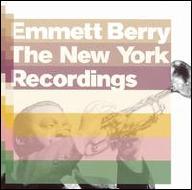As the '40s began, the trumpeter was beginning to keep company of great status in the jazz world. He played with a Teddy Wilson sextet, the rowdy Lionel Hampton band, the complex composer and saxophonist Benny Carter, and even with the master himself as a member of Roy Eldridge's Little Jazz Trumpet Ensemble. In the mid-'40s, the call came from Basie, beginning ten years spent almost completely on that band's bus. As the rock & roll era dawned, Berry continued gigging with stellar veterans of the jazz days, including swaggering singer Jimmy Rushing, scintillating saxophonist Johnny Hodges, burbling brass bubbah Cootie Williams, and boogie-woogie boogieman Sammy Price. Berry recording extensively in the '50s, as he had in the first two decades of his career, creating a discography that is as lengthy as a prima donna's backstage catering list. A relocation to Los Angeles, supposedly based on a desire to kick back, led to further work on the road with classic players such as Peanuts Hucko and Wilbur DeParis. There was never a shortage of bandleaders wanting to hire Berry, and one reason was that he was an excellent soloist, particularly in the short form. One of the great elements of the aforementioned Holiday recordings, of course, are the solo features by the likes of Berry, Lester Young, Buck Clayton, and others, seasoning the songs like genius chefs with unlimited spice racks.
Berry also led bands from time to time. Records under his own name include the Emmett Berry Five 1944 release with tenor honker Don Byas, later reissued on a Savoy album. The Mainstream compilation entitled Mainstream of the Blues: 1959-65, an item that sometimes shows its scratched-up face in used record piles, features the Emmett Berry Sextet as well as other cooking bands led by Buster Bailey, Snub Mosley, Buddy Tate, and Booty Wood. Berry retired to Cleveland in 1970, remaining a strong influence on trumpeters, even modern players such as Bill Dixon. He died there 23 years later, on June 22, 1993 (one month before his 78th birthday), his passing largely unnoticed in the media at the time. ~ Eugene Chadbourne, Rovi












